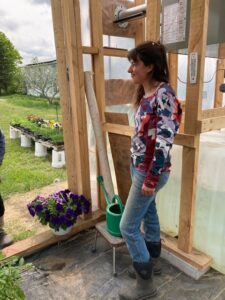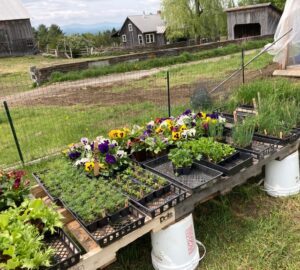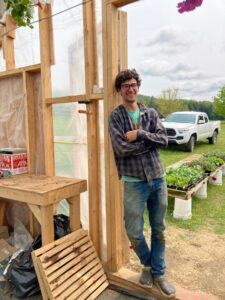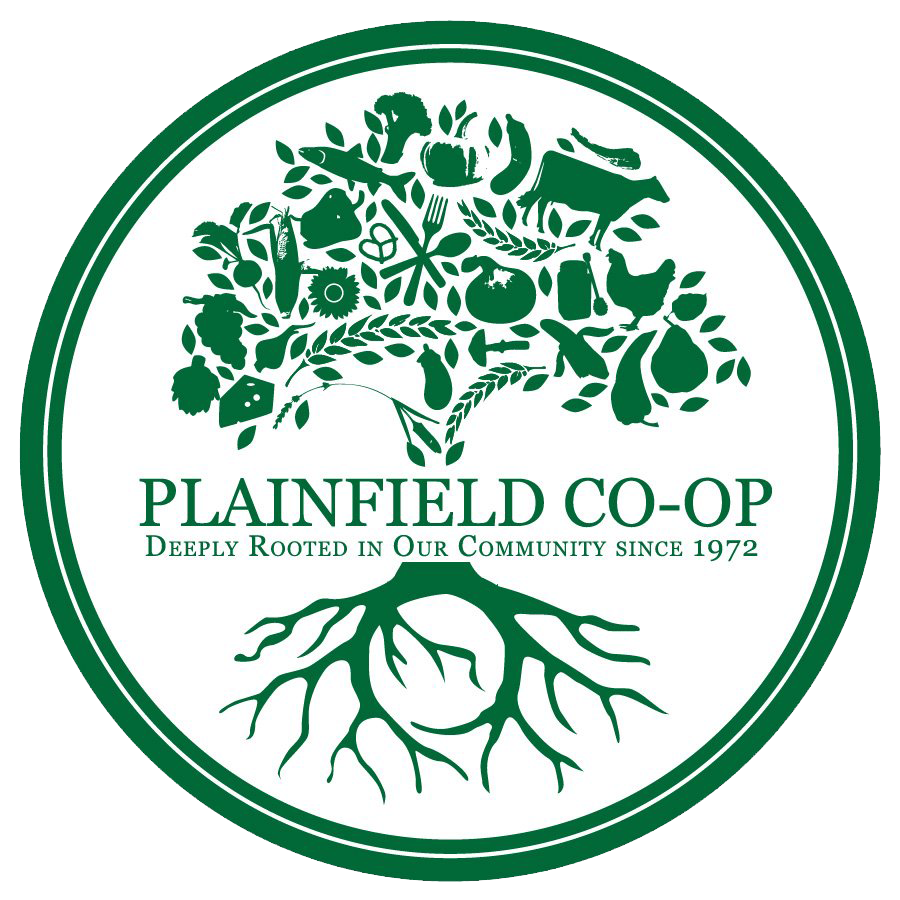by Gail Falk
Reprinted from Plainfield Co-op Newsletter: Summer 2023
For the past five years Kagen Dewey and Elise Magnant have been supplying Plainfield Co-op shoppers with organic produce raised on land they leased from Littlewood Farm. Last November they moved to a farm of their own.

Last fall the stars aligned for Blackbird Organics. Longtime Co-op member Elinor (Randy) Randall and her daughter Dorigen Keeney decided to sell their 86-acre farm on Maple Hill. Maggie Donin of the Vermont Land Trust learned that Kagen Dewey and Elise Magnant were looking for a farm where they could settle permanently and expand their farming operations. She brought Randy and Dorigen together with Kagen and Elise up on Maple Hill, and it was pretty much love at first sight.
Who wouldn’t love the beautiful west-facing rolling hills of hay fields and forest with sweeping views of the Green Mountains? The farm came with eight tillable acres, a house, barn, chicken coop, Randy’s art studio, a stunning crafted stone wall, two ponds, apple trees, a guest or rental cottage, a large woodlot in Current Use – and Borzo the cat.
Buying a farm is no simple matter if you are not independently wealthy, but Blackbird Organics found itself with the kind of wrap-around support that Vermont can offer young farmers. Randy had already deeded a conservation and agricultural use easement on the land to the Vermont Land Trust, which sees supporting young farmers as one of its core missions. This lowered the price considerably. The Land Trust could offer a bridge contract while Kagen and Elise worked out the details of moving, financing and starting a farm. Nikki Lennart, a Farm Business Specialist at the Intervale in Burlington, helped Kagen develop a business plan, apply for grants, and learn bookkeeping, as well as connecting him with resources from UVM’s Extension Service.

“Dorigen acted very generously through the whole process,” Kagen says, letting them move into the house and start excavating and building the greenhouse while negotiations were still in process. Over the winter, Kagen and Elise completed construction of a spacious, sturdy greenhouse, so that just five months after moving in, they were able to welcome neighbors and friends to a big spring plant sale in late May.
Describing the work ahead to convert the farm to organic vegetable and fruit farming, Kagen muses about the land’s evolution over the past hundred years from forest to sheep farm to dairy to hay farm with artist, and now to organic vegetables. (Neighbor Barry Kopecky has been haying the fields for 30 years, but he’s told Kagen he is ready to be done.)
To convert hay fields for vegetable crops, the first step is to plow up the sod. After plowing, they will plant cover crops, which are easier to till. “Agriculture fundamentally involves disrupting nature,” observes Kagen, “but there are wide variations in how that is done. Every choice involves trade-offs, so it’s important to be mindful of how our activity fits into the big picture.”
“The farm is an ecosystem,” he says, “and we are just one species in it. As a farmer, you are a link for consumers to tie into the food web. If you are eating our produce, you are a part of our farm’s ecosystem. I think the Plainfield Co-op and its membership understand that, which helps us feel supported in caring about how we do what we do.”

Kagen says that at the new farm he is trying to “recognize at every step the character of the land,” getting to know the microbial community and understand the hillside microclimate, which is different from the river valley fields at Littlewood. Much of the open land has “wonderful depth of arable soil,” he says, deposited eons ago on the leeward side of this glacial hill. He is thinking about pasturing chickens on some of the less tillable land.
As he muses about the possibilities this beautiful farmland offers and how he hopes to be a good steward, Kagen says “I cannot overemphasize how lucky we feel to be here.”
Blackbird Organics has a lease to continue to grow crops at Littlewood Farm. This year they are growing sweet corn, strawberries, and peppers, among other things, and Kagen sees the extra acreage as making it possible to rotate and rest fields on the two farms. Meanwhile, over at Littlewood Farm this spring, Betsy Ziegler and Joey Klein put on an annual plant sale, as they have for decades. Joey was there once again in charge of the plants, offering his wisdom and advice to gardeners old and new.
Joey is uncertain what the future holds for Littlewood Farm. He is pleased to lease the fields to Blackbird Organics for now, and, speaking of Kagen and Elise’s new farm on Maple Hill, he says with conviction, “I wish them all the luck in the world.” ❖
Photo credits: Gail Falk
